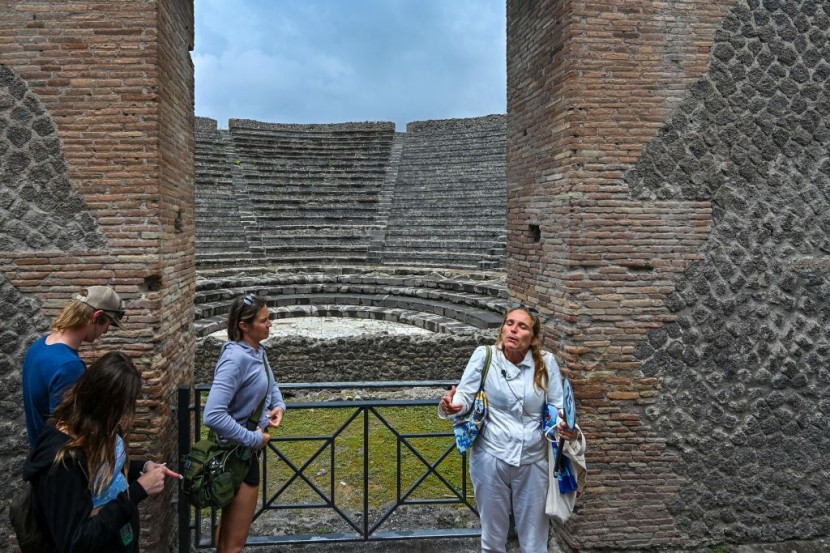
Is this the face that launched a thousand ships?
A banquet hall adorned with spectacular paintings of mythological characters and legendary heroes has been discovered among the ruins of Pompeii, officials announced Thursday.
The "spectacular" dining room featured "elegant black walls" with remarkably preserved frescoes of subjects inspired by the Trojan War, as told by the Greek poet Homer, according to a news release from the Archaeological Park of Pompeii.
The room was uncovered during excavations of block 10 in the ninth section of the ancient Roman city of Pompeii, which was destroyed and buried under ash in the eruption of Mount Vesuvius in A.D. 79.
"The dominant theme seems to be that of heroism, shown by the depictions of pairs of heroes and deities involved in the Trojan War, but also of fate and, at the same time, of the possibility, often not seized, that humans have of changing their own destiny," the park said.
According to legend, the Trojan war was set off when Helen, the wife of the king of Sparta and said to be the most beautiful woman in the world, eloped with — or was abducted by — Paris, the prince of Troy.
Along with Helen and Paris, the frescoes also feature the god Apollo, and Cassandra, who in Greek mythology was gifted with foresight but cursed by Apollo with an inability to alter the course of events.
According to archeologists, mythological figures are often found in Roman houses, where they "had the explicit social function of entertaining guests and table companions, providing talking points for conversations and reflections on life."
"The walls were painted black to prevent the smoke from the oil lamps being seen on the walls. People would meet to dine after sunset; the flickering light of the lamps had the effect of making the images appear to move, especially after a few glasses of good Campanian wine," Gabriel Zuchtriegel, the Director of the Archaeological park of Pompeii, said in a statement.
"The mythological couples provided ideas for conversations about the past and life, only seemingly of a merely romantic nature. In reality, they refer to the relationship between the individual and fate: Cassandra who can see the future but no one believes her, Apollo who sides with the Trojans against the Greek invaders, but being a god, cannot ensure victory, Helen and Paris who, despite their politically incorrect love affair, are the cause of the war, or perhaps merely a pretext. Who knows?" Zuchtriegel said.
"These days, Helen and Paris represent us all: each day we can choose whether to focus solely on our own private lives or whether to explore the way our lives are entangled with the broad sweep of history, thinking for example, not just of war and politics, or of the environment, but also of the atmosphere we are creating in our society, communicating with others in real time and on social networks," Zuchtriegel said.
The room has an area of about 49 feet by 20 feet, and opens to a courtyard with a long staircase leading to an upper floor. On the arches of the undecorated staircase, which appeared to be unfinished with building materials nearby, archeologists found charcoal drawings of two pairs of gladiators and what appears to be an enormous stylized phallus.
More than a third of Pompeii remains unexcavated and unseen by archeologists. The excavation of block 10 in the ninth section is part of a larger project to shore up part of the perimeter between the excavated and unexcavated areas, officials said.
— with reporting by TMX








